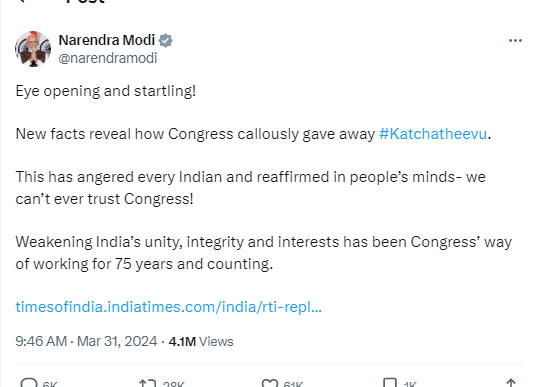With aggressively drafted two posts on X by Prime Minister Narendra Modi directly hitting congress and DMK parties in 24 hours followed by a surprise press conference by External Affairs Minister S. Jaishankar, Katchatheevu island issue has now taken a center stage in the Election campaign. It has become key issue not just in Tamilnadu but across India. The BJP's vigorous efforts to spread the word have amplified its significance. It appears that Congress and DMK lack a robust response to this issue, which involves the strategic island historically belonging to India but handed over to Sri Lanka during their tenure.
How Did it Become Political?
Political analysts see this move by PM Modi and BJP as savvy. BJP's Tamil Nadu chief and Coimbatore candidate, K. Annamalai, played a crucial role by initiating an RTI inquiry on March 5, probing the decision behind the island's handover by the Indira Gandhi government. With Congress in alliance with the ruling DMK in Tamil Nadu, BJP aims to capitalize on this issue in a state dominated by Dravidian politics.The RTI response unveiled Sri Lanka's persistent claim over 1.9 square km of land, just 20 km from the Indian shore, a matter contested by New Delhi for decades.

“Eye-opening and startling! New facts reveal how Congress callously gave away Katchatheevu. This has angered every Indian and reaffirmed in people's minds – we can't ever trust Congress,” PM Modi posted on X.
Shortly after PM Modi's posts on Monday, External Affairs Minister Jaishankar launched a factual attack on Congress and DMK. He defended the timing of raising the issue, stating it's been a longstanding matter, frequently debated in Parliament. He revealed having addressed the Chief Minister of Tamil Nadu on this issue at least 21 times. Jaishankar accused Congress and DMK of evading responsibility regarding the Katchatheevu issue.During the press conference, Jaishankar highlighted past prime ministers like Jawaharlal Nehru and Indira Gandhi referring to Katchatheevu as a “little island” or “little rock,” emphasizing that it has always been a contentious issue, not a sudden revelation.
“In an observation given by the then PM Jawaharlal Nehru in May 1961, he wrote, ‘I attach no importance at all to this little island and I would have no hesitation in giving up our claim to it. I do not like matters like this pending indefinitely and being raised again and again in parliament.' So, to Pandit Nehru, this was a little island, it had no importance, he saw it as a nuisance… For him, the sooner you give it away, the better…”
“This view continued on to Indira Gandhi as well,” Jaishankar added.
Following PM Modi's remarks, BJP and Congress leaders have engaged in a heated debate over Katchatheevu. Senior DMK leader RS Bharathi criticized the Prime Minister, alleging he lacked any significant achievements and was merely spreading falsehoods. Bharathi questioned why PM Modi didn't address the Katchatheevu issue during his ten-year tenure if he was genuinely concerned about it. Congress chief Mallikarjun Kharge echoed Bharathi's sentiments, stating that the Katchatheevu island was handed over to Sri Lanka as part of a diplomatic agreement in 1974. Kharge highlighted a similar gesture made by the BJP-led government towards Bangladesh regarding the exchange of border enclaves.
The Controversy Surrounding Katchatheevu
Katchatheevu situated approximately 33 km from the Indian coast near Rameswaram, has been a point of contention between India and Sri Lanka since the British colonial era when both nations were under British rule. Historically, the British attached the island to the Madras Presidency, citing traditional claims of the Ramnad zamindari of Ramanathapuram. However, disputes resurfaced post-Independence, primarily concerning fishing rights around the island.In a bid to resolve the discord and foster stronger ties with Sri Lanka, the government led by Indira Gandhi agreed to cede Katchatheevu to the island nation under the 1974 “Indo-Sri Lankan Maritime agreement.” At the time, the uninhabited volcanic island, measuring 1.6 km in length and around 300 m wide, was deemed to have minimal strategic significance. However, in recent decades, the geopolitical landscape has evolved, particularly with the rise of China and its increasing influence over Sri Lanka.
Significance of Katchatheevu for Tamil Nadu
Katchatheevu holds significant importance for Tamil Nadu, primarily due to the plight of Indian fishermen who venture into the area and face repercussions from the Sri Lankan authorities, most of whom hail from Tamil Nadu. The DMK, which governed Tamil Nadu in 1974, accused the Congress government of neglecting its concerns before consenting to the agreement with Sri Lanka. The party staged numerous protests during that period.Subsequent governments, including the one led by J Jayalalithaa, consistently raised the issue and even pursued legal recourse. Last year, ahead of a visit by Sri Lankan Prime Minister Ranil Wickremesinghe to India, Tamil Nadu Chief Minister MK Stalin urged PM Modi to address the matter. Following multiple arrests of fishermen by the Sri Lankan authorities, Stalin reiterated his plea to PM Modi, emphasizing the detrimental impact on the livelihoods of Tamil fishermen and the socio-cultural fabric of the region reliant on the fishing industry.Stalin's letter in February this year underscored the escalating tensions, citing a surge in arrests and seizures of fishing boats by the Sri Lankan navy. He highlighted the dire situation, wherein 243 fishermen and 37 boats were apprehended in 2023 alone, with a further 88 fishermen and 12 boats detained in just 28 days preceding the letter. These developments underscore the urgency of addressing the Katchatheevu issue to safeguard the interests of Tamil Nadu's fishing communities and preserve the region's economic stability and cultural heritage
Ram Kumar Kaushik is a seasoned journalist with over 25 years of experience across mediums. The architect of this news website, he is also a consultant with several media groups. He was formerly the group managing editor of ITV Network (NewsX, India News and The Sunday Guardian) and its digital products.